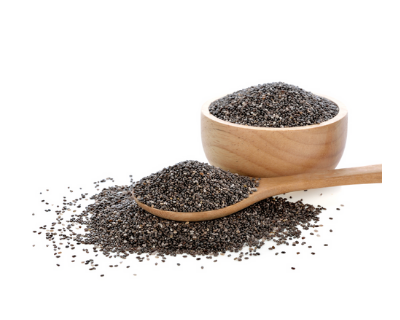What is Magnesium
Magnesium, an abundant mineral in the body, is naturally present in many foods, added to other food products, available as a dietary supplement, and present in some medicines (such as antacids and laxatives). Magnesium is a cofactor in more than 300 enzyme systems that regulate diverse biochemical reactions in the body, including protein synthesis, muscle and nerve function, blood glucose control, and blood pressure regulation.
Properties & Functions of Magnesium in our body:

Energy Production
Metabolism of carbohydrates and fats for energy production requires many magnesium-dependent biochemical reactions. Magnesium is required by the protein that makes ATP (adenosine triphosphate) in the mitochondria. ATP is the molecule that provides energy for almost all metabolic processes and it exists mainly as a complex with magnesium (MgATP).


Structural roles
Magnesium plays a structural role in bones, cell membranes and chromosomes. 60% of magnesium is stored in the bones and functions as a magnesium supply tank for our body. Studies show that magnesium deficiency is associated with osteoporosis while adequate magnesium intake is associated with good bone density.
Magnesium in our body
The human body contains an average of 25 mg of magnesium. About 60% of this is stored in the bones, only 1% circulates in the blood and the rest is stored in tissues and muscles throughout our body.
in bones
tissues & muscles
circulation
How much magnesium do we need in a day
According to the National Institutes of Health, the recommended daily allowance of magnesium depends on age and gender.

| Age | Men 🚹 | Women 🚺 |
|---|---|---|
| 0-6 months | 30 mg | 30 mg |
| 7-12 months | 75 mg | 75 mg |
| 1-3 years | 80 mg | 80 mg |
| 4-8 years | 130 mg | 130 mg |
| 9-13 years | 240 mg | 240 mg |
| 14-18 years | 410 mg | 360 mg |
| 19-30 years | 400 mg | 310 mg |
| 31 years and above | 420 mg | 320 mg |
Foods rich in Magnesium
Magnesium is naturally present in some foods while being added to others. It is easy to get the recommended daily allowance of magnesium by following a varied diet that includes foods such as:
- Legumes, nuts, seeds, whole grains and green leafy vegetables (eg spinach)
- Fortified breakfast cereals and other fortified foods
- Milk, yogurt and other dairy products
Below is a list of foods that naturally contain magnesium. Foods rich in magnesium are mainly of plant origin with pumpkin seeds, spinach and nuts at the top of the list. Daily coverage refers to the daily intake of men over 31 years which is 420 mg and women over 31 years which is 320 mg.
Plant Origin

30 gr pumpkin seed (4 tablespoons)
156 mg | 132 calories

1 cup boiled spinach (180 gr)
156 mg | 40 calories

30 gr. chia seeds (3 tablespoons)
111 mg | 145 calories

188 gr of boiled lima beans (1 cup boiling)
81 mg | 216 calories

20 almonds (30 gr)
80 mg | 155 calories

20 cashew nuts (32 g)
74 mg 180 calories

50 gr oat flakes (1/2 cup)
74 mg | 183 calories

30 gr dark chocolate
65 mg | 180 calories

10 gr cocoa powder (2 tablespoons)
50 mg | 23 calories

1 small avocado 🥑 (135 gr peeled)
40 mg | 210 calories

1 banana (126 gr. peeled)
34 mg | 112 calories
Animal Origin

1 cup low-fat yogurt (227 g)
38.6 mg | 143 calories

1 glass of milk 2% fat (244 gr)
29.3 mg | 122 calories
Magnesium and Health
Magnesium is a key factor in the smooth functioning of many parts of the body:
- the heart
- the bones
- muscles
- nerves and more
Without enough magnesium, these areas malfunction. Research has shown that a magnesium deficiency or a low magnesium diet leads to health problems. On the other hand, high magnesium diets are associated with lower rates of disease while clinical trials show that magnesium supplementation can correct those conditions.

Bone Health
Magnesium is a component of bones. 60% of the magnesium in our body is stored in the bones. It is involved in the process of producing bone growth cells and the action of parathyroid hormone, which regulates calcium levels. High magnesium diet has been associated with increased bone density while low magnesium intake leads to reduction in bone density and weakening of the bones.

Τype 2 diabetes
Magnesium helps enzymes that regulate blood sugar and insulin activity. There have been several studies on the relationship between magnesium intake and type 2 diabetes with mixed results. The American Diabetes Association reports a lack of data at present to suggest magnesium supplements to improve blood sugar control in people with diabetes. However, several studies have linked adequate magnesium intake to a reduced risk of developing diabetes, lower fasting sugar, and higher insulin in healthy individuals.

Migraines
Magnesium supplements are prescribed to treat migraines as many studies have shown that people who suffer from migraines have low magnesium levels. Another study found that taking magnesium citrate and magnesium oxide supplement (approximately 500 mg / day) for three months helped to prevent migraines. However because magnesium causes side effects (muscle weakness, diarrhea) at higher doses than recommended (420mg for men and 320mg for women) it is advisable to consult a doctor before increasing magnesium intake.

Cardiovascular diseases
High blood pressure is a risk factor for cardiovascular disease and magnesium helps regulate blood pressure. Studies have shown an association between high blood pressure and magnesium deficiency.
Craving for chocolate and magnesium deficiency
Although there is a common belief that chocolate cravings are due to a lack of magnesium this has not been proven by research so far. According to scientists, there are foods with much higher magnesium content, such as pumpkin seeds but no one ever mentioned craving them.
Chocolate is a food high in sugar and fat and belongs to a group of foods for which the cravings we feel have more to do with the reward system in our brain, eating disorders, premenstrual syndrome in some women or our eating habits.
However, do not hesitate to add a small amount of dark chocolate to your diet, as many studies agree that in the context of a balanced diet dark chocolate has several benefits for our health.
Symptoms of magnesium deficiency
Magnesium deficiency due to low dietary intake in healthy individuals is uncommon because the kidneys limit its excretion in the urine. However, usually low intakes for a long time or excessive magnesium losses due to certain health problems, chronic alcoholism or the use of certain medications can lead to magnesium deficiency.
The first signs of magnesium deficiency include loss of appetite, nausea, vomiting, fatigue and weakness. As magnesium deficiency worsens, numbness, tingling, muscle contractions and cramps, seizures, personality changes, abnormal heart rhythms and coronary spasms may occur. Severe magnesium deficiency can lead to hypocalcaemia or hypokalaemia (low serum calcium or potassium levels, respectively) because the homeostasis of the metals is disturbed.
- Loss of Apetite
- Nausea, Vomiting
- Fatigue and Weakness
- Numbness, tingling
- Muscle contractions and cramps
- Seizures, Personality Changes
- Hypocalcaemia, Hypokalaemia
Who is at risk of magnesium deficiency
Certain diseases or health conditions can lead to decreased magnesium levels. This happens with diseases that reduce the absorption of calcium in the intestine or increase the excretion from the body. People who are most at risk of magnesium deficiency are:
- People with gastrointestinal diseases
- People with type 2 diabetes
- People with alcohol dependence
- Elderly 🧓
Forms of Magnesium Supplements
-
Magnesium Citrate
Magnesium citrate is one of the most popular forms of magnesium in dietary supplements because it has very good absorption. It is also used as a medicine to fight constipation, which is why some people may experience gastrointestinal upset such as diarrhea.
-
Magnesium Glycinate
Magnesium glycinate is a compound of magnesium and glycine (amino acid) highly tolerated by the body with minimal side effects. It is used as a dietary supplement in people who need higher doses or have side effects on other forms of magnesium.
-
Magnesium Malate
This type of magnesium is a compound of magnesium and malic acid. It is extremely bioavailable and people tolerate it well.
-
Magnesium Lactate
This type of magnesium is a compound of magnesium and lactic acid. According to a 2017 analysis, magnesium lactate is easily absorbed in the gut.
-
Magnesium Chloride
Magnesium chloride is a type of salt used in topical magnesium products, such as magnesium oils and some bath salts. People use it as an alternative method to get more magnesium transdermally.
-
Magnesium sulfate
Magnesium sulfate is the form of magnesium in the well-known Epsom salts used in baths or foot baths to soothe muscle aches.
-
Magnesium Oxide
Doctors prescribe magnesium oxide to treat constipation or as an antacid for heartburn and indigestion.
-
Magnesium Taurate
This type of magnesium is a compound of magnesium and taurine. Limited evidence suggests that it may be able to lower blood pressure and protect the cardiovascular system. However, more research is needed to use it in people with heart problems.
-
Magnesium L-threonate
It is formed by mixing magnesium and threonic acid (a substance derived from the metabolic breakdown of vitamin C). Animal studies have shown that this form of magnesium helps increase magnesium levels in brain cells. More researche is neede on possible benefits to the brain and related disorders (depression, dementia due to age, etc.)
Symptoms of High Magnesium Intake
Excessive magnesium intake from the diet does not pose a health risk as the kidneys eliminate the extra amount.
However, high doses of magnesium from dietary supplements or medications can cause side effects such as nausea, diarrhea and abdominal cramps.
Magnesium toxicity occurs at very high doses of magnesium (more than 5000mg daily) which can even lead to death. Symptoms of magnesium toxicity, which usually develop after serum concentrations in excess of 1.74-2.61 mmol / L, may include hypotension, nausea, vomiting, flushing, urinary retention, ileus, depression and lethargy before progressing to muscle weakness, difficulty breathing, extreme hypotension, irregular heartbeat and cardiac arrest. The risk of magnesium toxicity increases with impaired renal function or renal insufficiency because the ability to remove excess magnesium is reduced.
For this reason, the maximum allowable intake of magnesium from supplements is 350 mg per day for men and women over 19 years.
Symptoms of high intake
- Diarrhea
- Abdominal cramps
- Nausea
Symptoms of toxicity
- Hypotension
- Facial flushing
- Urine retention
- Lethargy and muscle weakness
- Irregular heartbeat
- Heart attack
Sources & Links
- Food and Nutrition Board, Institute of Medicine. Magnesium. Dietary Reference Intakes: Calcium, Phosphorus, Magnesium, Vitamin D, and Fluoride. Washington, D.C.: National Academy Press; 1997:190-249
- Oregon State University - Linus Pauling Institute » Micronutrient Information Center-Magnesium
- Harvard TH CHAN -School of Public Health > The Nutrition Source > Magnesium
- Harvard Medical School -What you should know about magnesium
- Harvard Medical School -Magnesium content in milligrams (mg) of certain foods
- University of Rochester > Medical Center > Health Encyclopedia
- Types of magnesium supplements and their benefits - Medical News Today
- 10 Interesting Types of Magnesium (and What to Use Each For) - Healthline
- Magnesium Fact Sheet for Health Professionals - U.S. National Institute of Health
- Sugar and Fat: Cravings and Aversions Susan Yanovski The Journal of Nutrition, Volume 133, Issue 3, March 2003, Pages 835S–837S



